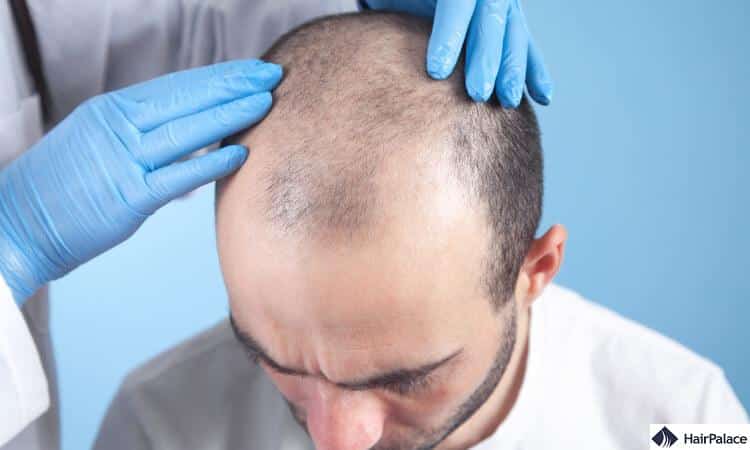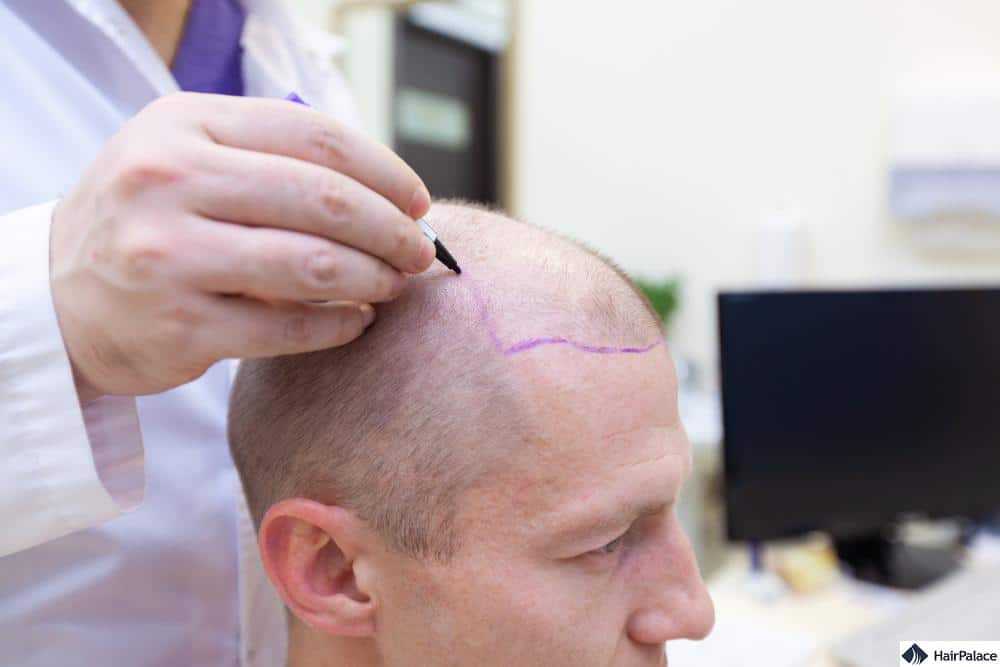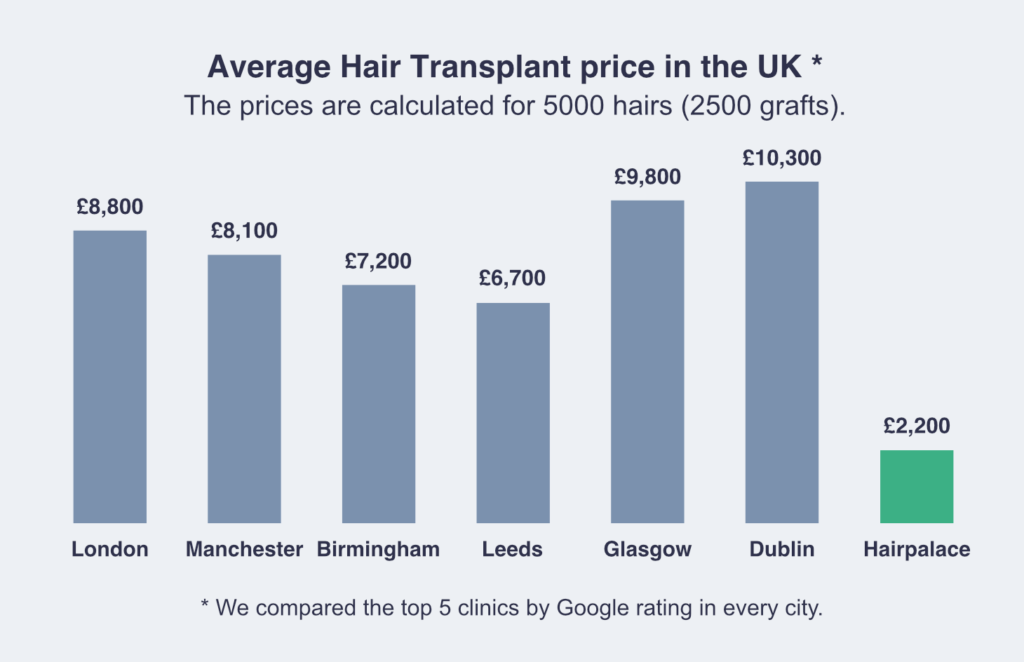Can You Get a Hair Transplant on The NHS?

The National Health Service (NHS) in the United Kingdom provides a wide range of services and treatments to its citizens.
But do these services include hair transplantation?
Well, the simple answer is that in most cases a hair transplant on the NHS isn’t possible.
However, there are various other ways one can take to secure a hair transplant and restore their former looks.
This article will provide information about how hair transplantation is available on the NHS, and what other options are there for those that aren’t eligible for one.
- Can you get a hair transplant on the NHS?
- Why aren’t hair transplants provided on the NHS?
- How the NHS can help you
- Benefits of going private
- How to choose the right clinic
- Costs
- Is it the right choice for you?
- Conclusion
Can you get a hair transplant on the NHS?
The NHS lists hair transplants among cosmetic procedures, which means that they don’t consider it to be a necessary or life-saving intervention.
This means that a hair transplant is not covered by the standard NHS services.
However, there are some exceptions when you may get a free hair transplant on the NHS.
Why aren’t hair transplants provided on the NHS?
The UK has a general medical council called The National Institute of Health and Care Excellence (NICE), which assesses the practicality and importance of a procedure.
They are the main body that decides whether a procedure should be conducted on the NHS or in independent clinics.
The effect of the procedure on the patient is measured against the time and money invested by the government.
Given how the demand for NHS services is constantly on the rise, the funding constraints cause the selection criteria to become harsher each year.
Unfortunately, the limited resources mean that an expensive procedure such as hair transplantation is rarely funded by the NHS.
Although hair transplant surgery has various benefits on a patient’s self-esteem and self-confidence, it is far from a life-saving treatment.
How the NHS can help with your hair transplant

The NHS may provide cosmetic surgery for those who suffer from trauma-related hair loss.
This includes patients who have suffered from lasting health problems such as burns, accidents or other forms of physical trauma.
In these cases, the NHS may provide hair transplantation to help restore the patient’s appearance.
In addition, the NHS may provide hair transplantation for medical conditions such as alopecia areata.
Patients who suffer from this condition often experience patchy or complete hair loss, and the NHS may provide hair transplantation if other treatments have been ineffective.
Finally, the NHS may provide hair transplantation for those who suffer from severe mental health issues due to their hair loss.
This is often the case for those living with alopecia, as the condition can cause significant psychological distress.
What are the benefits of going private?
The NHS is one the greatest institutions in the United Kingdom, providing accessible health care for the masses.
It provides healthcare services based on a patient’s individual needs rather than their ability to pay.
Giving people their human right to be treated safely and affordably.
The NHS has been under a considerable amount of strain for a number of years now, which has made them unable to afford certain treatments such as hair transplants.
While hair transplant costs at a private clinic can be rather high, these institutions make the treatment accessible and possible without the constraints of NHS hair transplants.
Opting for private healthcare unlocks a wide array of benefits such as:
- Shorter waiting times
- Having access to a bigger variety of medications and treatments
- Better quality equipment
- Faster access to a medical specialist
- More advanced personal care
A private hair transplant also allows you to choose your GP, treatments and clinics.
Private clinics such as HairPalace offer the utmost patient care, with surgeons who have decades of experience in the field.
Having cosmetic surgery at a private clinic also allows you to plan your surgery ahead without interfering with other aspects of your life.
How to choose the right clinic for your hair transplant

Choosing the right clinic is essential to ensure you get the results you’re looking for.
If you’re looking for a clinic within the UK, always make sure that they are registered with the Care Quality Commission.
All private clinics operating in the UK are required to do so if they wish to conduct cosmetic surgeries.
Furthermore, it’s also important to check the Google reviews of your clinic and see how previous patients were treated.
This will allow you to see what is the level of care you can expect to receive.
It’s also a good idea to look at their before and after photos and ask whether they provide a written guarantee for their work.
Make sure you do thorough research before you decide on a clinic, as choosing the wrong one can come with drastic consequences.
How much does a hair transplant cost?
The average cost of a hair transplant in the UK can range between 3000-10,000 pounds.
The cost may vary based on a number of different factors, including the type of method, the experience of the surgeon and your clinic’s reputation.
The biggest factor however will be the number of grafts you need to be transplanted.
The cost of the procedure usually includes consultations and the cost of any necessary medications or aftercare.

Is hair transplantation the right choice for you?
Hair transplantation has become increasingly popular as a solution to hair loss.
The procedure is most effective for people who have lost hair due to hereditary baldness or male-pattern baldness.
For people with other causes of hair loss such as alopecia or chemotherapy-induced hair loss, the results may not be as successful.
Hair transplants are not without risks. The procedure can cause scarring, pain, and in some cases, infection.
Furthermore, the results of a hair transplant aren’t immediate and may take several months to become apparent.
Finally, not everyone is a good candidate for the procedure, and it is important to find out if hair transplantation is the right choice for you.
A doctor can provide information about the risks and benefits of the procedure, as well as other options that may be available.
Conclusion
A hair transplant on the NHS is generally not feasible. but there are certain ways in which the NHS may help.
One of the first steps would be to get in contact with a doctor, a trichologist or your local GP.
A doctor will be able to carry out tests and advise you on the best hair loss treatments for your personal needs.
HairPalace is dedicated to providing high-quality Follicular Unit Extraction procedures.
Our clinic uses the latest FUE2 Safe System, ensuring a quick and pain-free procedure with fantastic results.
If you’re interested in getting a hair transplant and want to know more about your hair loss treatment options contact our team.
We will be able to review the extent of your hair loss and provide you with an extensive treatment plan.
Hair transplant NHS UK FAQ
The NHS generally does not cover hair transplants for cosmetic reasons. They may provide funding for a hair transplant only in exceptional cases, such as for individuals who have experienced hair loss due to injury, burns, or diseases that cause scarring alopecia. For cosmetic cases of baldness, such as male pattern baldness, individuals would typically need to seek private treatment.
Last medically reviewed on December 2nd, 2024
- NHS on hair transplantation https://www.nhs.uk/conditions/cosmetic-procedures/cosmetic-surgery/hair-transplant/
- Rassman WR, et al. Follicular unit extraction: minimally invasive surgery for hair transplantation. Dermatol Surg 2002;28:720-8.https://journals.lww.com/dermatologicsurgery/Abstract/2002/08000/Follicular_Unit_Extraction__Minimally_Invasive.14.aspx
- Bernstein R. Follicular unit hair transplantation. 2010.https://www.researchgate.net/publication/267451081_Follicular_Unit_Hair_Transplantation_2010
- Rose P. Hair restoration surgery: challenges and solutions. Clin Cosmet Investig Dermatol. 2015;8:361-370.https://doi.org/10.2147/CCID.S53980


